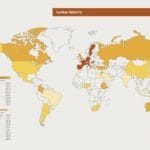- Food Industry Executive
- Posts
- France Remains World Leader in 2017 Food Sustainability Index; US and Arab States Show Major Room for Improvement
France Remains World Leader in 2017 Food Sustainability Index; US and Arab States Show Major Room for Improvement

LONDON —
Behind France is Japan and Germany, also with good performances in food loss and waste; sustainable agriculture; and nutritional challenges.
High-income UAE ranks last, while low-income Ethiopia ranks a respectable 12th.
The US languishes in 21st place, due to a poor performance in sustainable agriculture and nutritional challenges.
France remains at the top of the 2017 Food Sustainability Index (FSI), thanks to high scores across the FSI’s three pillars of food loss and waste, sustainable agriculture, and nutritional challenges.
The FSI ranks 34 countries according to their food system sustainability. These countries represent over 85% of global GDP and two-thirds of the global population. The FSI was developed by The Economist Intelligence Unit with the Barilla Center for Food & Nutrition Foundation (BCFN).
Top-performing countries in the FSI also include Japan, Germany, Spain, Sweden, Portugal, Italy, South Korea and Hungary.
Although high-income countries tend to perform well in the FSI, there are several outliers. Despite having the highest GDP per head, the UAE ranks last, while Ethiopia, the poorest country in the FSI, ranks a respectable 12th. In common with other countries in the Arab world, the UAE has a high level of food waste, rising levels of obesity and receives a low score for sustainable agriculture.
The US languishes in 21st place. The country achieves only a dismal 31st place in sustainable agriculture. In terms of nutritional challenges, the US ranks 24th, dragged down by elevated levels of consumption of meat, saturated fat and sugar content.
Martin Koehring, managing editor at The Economist Intelligence Unit, added: “Sustainable food systems are vital in achieving the UN’s 17 Sustainable Development Goals. Major global developments such as climate change, rapid urbanisation, tourism, migration flows and the shift towards Westernised diets put food systems under pressure. The Food Sustainability Index is an important tool to help policymakers and other relevant stakeholders to design effective policies to improve food system sustainability.
About The Economist Intelligence Unit
We deliver vital business intelligence to executives the world over. With access to over 650 expert analysts and editors across 200 countries worldwide we uncover novel and forward-looking perspectives. More information: https://www.eiuperspectives.economist.com.
About the Barilla Center for Food & Nutrition Foundation
The Barilla Center for Food & Nutrition (BCFN) Foundation is a think-tank, founded in 2009, with the aim of analysing themes linked to food and nutrition globally. More information: http://www.barillacfn.com
Press enquiries
Ross Jenkinson, Global Head of Marketing – Thought LeadershipT: +44(0)207-576-8047M: +44(0)78-4151-3573E: [email protected]
SOURCE: PR Newswire